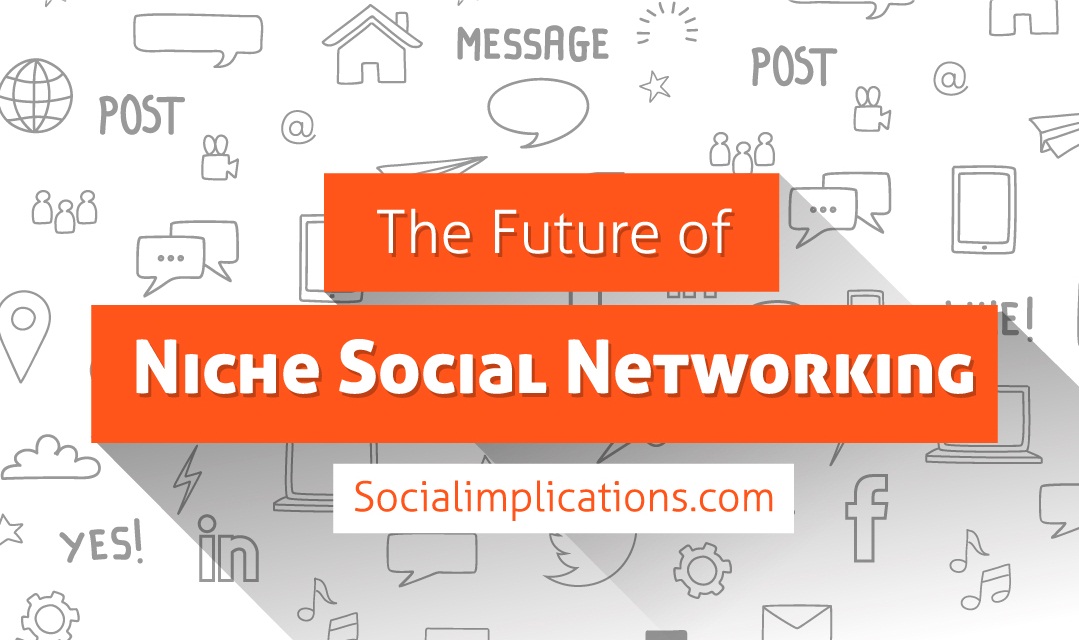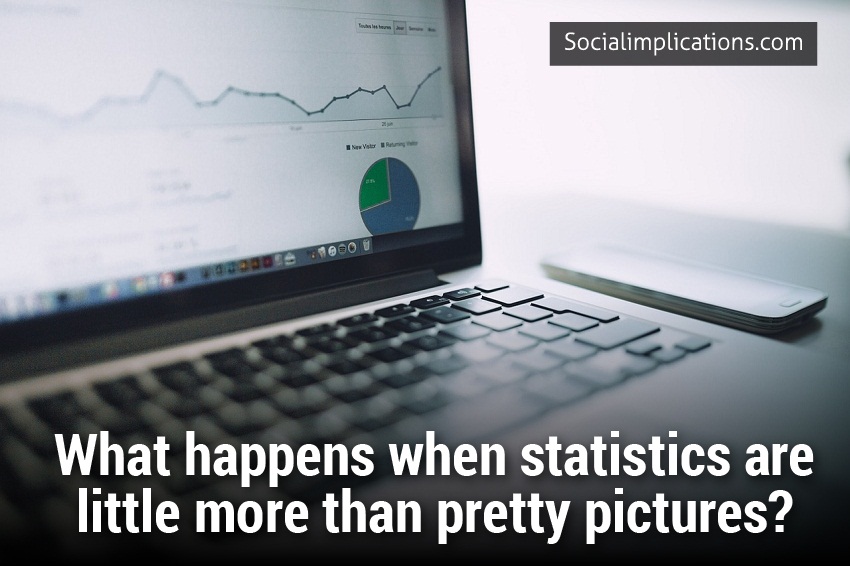
Recently I’ve torn into Mashable not one, but two, times. In both cases the issue had to do with them posting either misleading or downright false statistics and claims (and readers have since made me aware of two more instances with false headlines). People have been doing that for ages, so why did it bother me so much? It bothers me because that site has a large audience — an audience that seems to believe what they say, and an audience that proceeds to pass along that misinformation until it becomes “fact” in far too many minds, or even spreads to major media outlets (although that’s an issue all its own).
These stats issues have me wondering something. Does social media stop people from thinking for themselves? Have we lost the ability to think critically with the 24 hour news cycle and occasional blurs between general blog commentary and actual journalism (not that they’re mutually exclusive)? Let’s talk about it.
Better Informed or Blindly Following?

I know some people will probably say that since we have access to more information and more sources thanks to social media tools, that we’re actually better informed. And I think there’s merit to that argument. If people are responsible about the sources they follow, and they can think critically about what they read or see or hear online, then more information might not be a bad thing. We have more control over the filters now.
But there’s the issue — to make that work we have to be able to think critically about that information and know when to take things with a grain of salt. It involves a level of responsibility that perhaps didn’t exist in news consumption a few decades ago. We have the ability to pass on the news far more quickly and almost effortlessly. And while I have no doubt that many people can and do know how to evaluate sources before passing information along, I see no excuse for the thousands of retweets and Facebook shares and the like that result from hyped up, misleading information being thrown out there not only by Mashable but by any site or person too lazy to get the real story first.

Are we in a world where the virtual sound bite is the news? In a time when we’re being bombarded with message after message and story after story, is information overload leaving some of us without the time to really look beyond those snippets before we think “hey, that sounds interesting, so let me pass it along?” Is it a case of not having that time to read, evaluate, and think critically, or are people just getting lazier as they immerse themselves more in social media? Has it become acceptable to pass something along just because a friend said it for example, or because it came from a favorite site? Or do you feel most of us are above the cliques and back-patting where we look for constant validation, and can take the broader information available and make better decisions for ourselves?
I don’t have the answers, and I won’t pretend to. I know there are some people in both groups. But I’d like to hear what you think. In your own target audience, community, etc. do you feel that the social Web helps or hinders the decision-making and critical thought processes? Are we better informed, or is our information lacking because we get it in too many bite-sized pieces? Share your thoughts in the comments below.














This is something I’ve been thinking about recently and appreciate your thoughts here. I don’t know if critical thinking has changed much in history. Go back in time and people have used things like the bible (to use an extreme) to shortcut thinking. By accepting something, or someone, as an authority you don’t have to think about new ideas. How long did it take religion to accept many new scientific ideas.
Unfortunately, or fortunately depending on what side you’re on, this shortcut in thought has allowed many people with little or no experience in any realm to become experts in the eyes of the masses. You can’t blame the technique. Social media is definitely a place where the ‘buyer beware’ mentality is important and eyes should always remain wide open and critical.
How do you personally know that “new scientific ideas” are more valid than the Bible you consider an extreme example? Science IS the new religion sold to the masses. I wish I could find that recent commercial that has the words “blinded by science” at the very end.
I do NOT wish to open a huge debate about science and religion here (but will gladly debate that with anyone elsewhere – we do not want to hijack this thread and get off topic). I simply want to point out that few question what they have been raised to believe and automatically dismiss everything else.
The path to wisdom is to question EVERYTHING and apply discernment and what can be known before reaching conclusions.
You’re right that this is not the appropriate forum for religious debates, so let’s leave that behind and focus on the real issues at hand.
While I think legitimate scientists do a fairly good job of questioning things (it’s their job to do so), you’re right in that people should question things on both sides of the spectrum. And I think when it comes down to your Average Joe, he can be equally blinded by religion or bad science depending on the views of those around him, and those teaching him. This is why cults exist. It’s also why people still buy health products promising to help them safely lose 20 lbs in two days.
What I’m more interested in these days isn’t how a group mentality or family dynamic influences someone’s perception of fact though. It’s more about this newer ability to influence people in massive numbers, either through your own online presence or viral effects. The social Web is turning into “whisper down the alley” on steroids. And I find that mildly disturbing. Okay. Maybe more than mildly.
Please don’t make comments speaking out against any specific religion, religious text, etc. Whether or not you or I agree with a specific religious belief is well beyond the scope of this post. There are extremists in all religions. I’ll grant you that.
You do make a good point about authority figures. When people see someone as an authority, they do seem to take things they say as fact without questioning or thinking beyond what they hear or see.
I don’t blame the technique. But I do blame those so-called “experts” who spread false information knowing that people will blindly believe what they say. They do it intentionally in many cases for linkbait, with little care about making sure people are clear on the facts. And if you want to be an authority source of information, you’d damn well better be responsible with that (dare I say it?) “influence.” I don’t think these so-called experts are to blame for people not thinking critically about issues before believing what they see and passing it on. But I do think they sometimes intentionally exploit that behavior. And that’s disgusting at best.
My apologies. I didn’t proof my comment before sending. I meant to add how Galileo’s ideas about the earth not being the center of the universe was quickly dismissed by the church. I can say the same for people on the science side regarding biblical references too.
What commonly happens online is, for example, someone does a “test” and shows they received a 16% boost in conversions because the changed the color of their “buy now” button. This is posted to their blog and then is spread across the net like gospel and everyone is changing their “buy now” buttons to the “better” color instead of conducting their own test to validate the claim.
As someone who’s spent the last 16 years in direct response marketing, sending out thousands of mailings and testing silly variables to attempt the slightest increase in response, it’s funny to watch people so blindly accept what ‘experts’ think is true. I don’t know if the ‘experts’ are intentionally out to dupe the masses or not. Often, it appears to be a claim they think is true and then takes a life of its own, because of the gullible masses.
Interesting point to add, which I can’t find the actual study to prove right now. Robert Cialdini, author of the book Influence, did a study to try and train individuals to recognize false authority. He wanted to see if he could help society avoid being duped by false authority. This is the “I’m not a doctor but I play one on tv” type of fake authority. Unfortunately, after teaching the subjects how to identify the false authority message, the subjects were actually more easily influenced by the false authorities. They think the subjects increased confidence in being able to ‘think critically’ actually dropped their resistance to the false messages.
It’s an interesting study in human behavior. We all have so much to think about in life we all look for shortcuts to thought and work. Many “experts” provide this.
I don’t doubt that color changes can affect conversions. I’ve seen it happen. It’s well known on the consumer psychology side of marketing that colors influence people subconsciously. But the problem comes when people assume a change’s effect for one person will automatically translate into the same for them. Markets are different, audiences are different, and what works for one could be a royal failure for just about everyone else.
I wouldn’t go so far as to say I think most “experts” are intentionally trying to dupe people. But I think they’re often irresponsible when they should know their audience well enough to anticipate reactions like blind belief. After all, if you don’t know your audience, you have no business targeting them. In this example we’re just talking about anecdotal evidence of something. And I don’t think there’s anything wrong with that. Sharing personal stories and experiences is a big part of blogging and other social media use. People just have to be careful about taking that anecdotal evidence and projecting it onto their own situation, site, or business.
I’ve actually been happier recently on this front. A colleague has been passing along articles related to the Times paywall issue, and I’ve noticed people are finally calling out faulty stats on a somewhat consistent basis. It gives me hope that maybe we’re not all just a bunch of followers after all. But I guess we’ll see. Just like the color of buttons, one case doesn’t prove too much beyond itself.
I like the article. I’d say we are definitely in an age where a digital sound bite is the news. But, in the end people still make up their own mind. Fox News and MSNBC are both popular largely because they simple validate what some people already believe. What people get out of social media works the same way.
Your comment seems to contradict itself. If people are seeking sources solely to validate their existing beliefs, then no, they’re not really making up their own minds. Making up your mind on an issue means forming an opinion. And it’s impossible to form an opinion without basing it on facts — by it’s very nature an opinion is someone’s personal slant or view about a set of facts. If you don’t base a belief on a foundation of facts, it’s not an opinion — it’s a delusion.
So if people aren’t getting facts because they’re too busy believing whatever their favorite self-proclaimed expert says, they’re not thinking for themselves at all. Thinking for yourself isn’t only about forming opinions, but also about reinforcing them over time or changing them.
We have moved from Major Media deciding what we see and what we should be thinking to more of the same online including intentional disinformation, propaganda and spin. This is as it has always been as we should easily be able to see since the famous quote “Lies, Damn Lies and Statistics” has been around since the early 1800s.
Now that is complicated by the Internet giving voice to anyone who wants to share their knowledge, expertise and experience – at least as long as we don’t lose that ability due to threats to Net Neutrality and even handing the U.S. President an Internet Kill Switch.
Those who think that can’t happen aren’t paying attention. That kill switch link already claims “Sixty-one percent of Americans said the President should have the ability to shut down portions of the Internet in the event of a coordinated malicious cyber attack, according to research by Unisys.” (How many online businesses could survive a four month or longer outage?)
Is there really such a study? Who knows? If there is was it conducted properly? We don’t know that either. What many do not realize is that by selectively choosing the timeframe involved and altering variables you can use statistics and now Web Analytics to support nearly any opinion.
Did you know that “73.6% of all statistics are made up”? No you can’t know that because no one can measure that – but I bet many will believe it. Most accept anything whatever sources they believe are credible says or writes and instantly dismiss all others – which is precisely what they have been conditioned to do their entire lives. This can be easily seen regularly as in this report about made-up trade statistics,
Few question that conditioning or apply any discernment at all and I don’t believe followers are going to suddenly wake up and start thinking for themselves. What the Internet allows is for us to see more people who do think because they are more likely to choose to express themselves online.
There are different ways of passing information along. Even thinkers may RT a link they disagree with or containing information they have not thoroughly researched because they know we are each responsible for what we believe. These glaring issues jump out at you because of your background, but others have different backgrounds and will not necessarily know or have time to vet what is being said.
If we are personally recommending something on our blogs we definitely need to be far more selective than when we pass along links for others to check out for themselves. It is not our task in life to protect others from disinformation or lack of wisdom. The older I get the more I realize that is an impossible burden to take up – and we don’t want to end up being the Big Brother to others that we ourselves do not want.
I disagree. If you put yourself in the position of being an authority source, then you have a responsibility to provide authoritative information. And in that case, yes, it’s a problem if you’re spreading disinformation knowingly. It has absolutely nothing to do with taking on a role of Big Brother. We’re not watching people or forcing them into anything. They come to us for an authoritative look at something — news, a niche topic, etc. And if we can’t give that, then we have no business being that position in the first place.
As for my background differing from others, it makes no difference at all. If you can’t vet what you’re passing along, you shouldn’t pass it along. Period. There is never an excuse for being irresponsible — not for the end reader to be irresponsible in their consumption of the material, and not for some “authority” source to be irresponsible in what they pass on. When you link to something or RT something, you’re essentially endorsing it. That’s one of the oldest concepts on the Web — it’s all about “votes.”